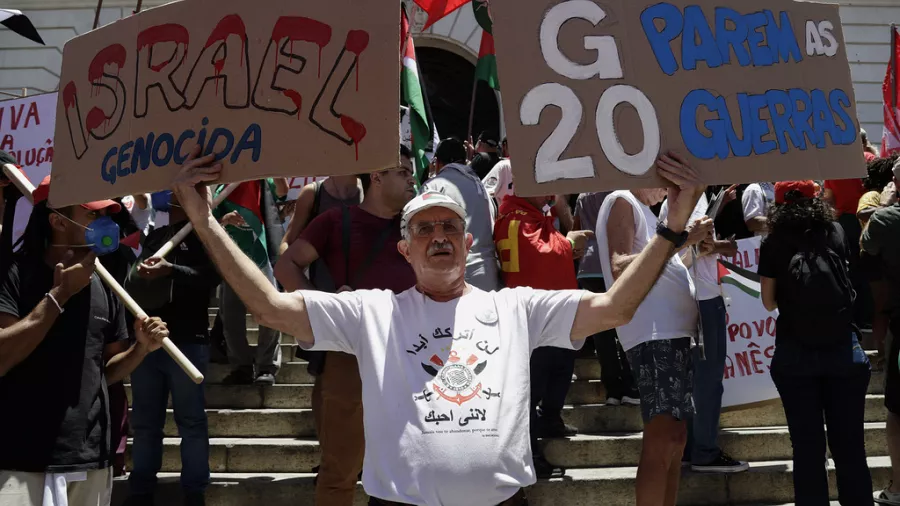
As world leaders gather for the G20 summit in Rio de Janeiro, thousands of pro-Palestinian demonstrators have taken to the streets to demand an immediate ceasefire in Gaza and a complete break in diplomatic relations between Brazil and Israel. The protests, which erupted as the summit discussions unfolded, are centered around the ongoing conflict in Gaza, with demonstrators calling on the Brazilian government to take a stronger stand against Israel’s military actions.
The protests come at a critical moment, with tensions escalating in Gaza and Ukraine. Protesters argue that, as the conflict in Gaza drags on into its second year, international pressure is necessary to end the violence. They are calling for urgent action, with many also drawing attention to the broader implications of the United States’ upcoming elections, and how the potential leadership of Donald Trump could impact international responses to global conflicts.
Keliana Neves Gonçalves, a member of the Palestinian People’s Solidarity Committee, spoke passionately about the demonstration’s purpose: “We are here to ask the Brazilian government to immediately break off relations with the state of Israel, and to demand an immediate ceasefire. The international courts have already condemned Israel for what can be described as an unprecedented atrocity.” Gonçalves referred to what she described as the “first infanticide in history,” emphasizing the scale of violence against Palestinian civilians.
The call for a ceasefire in Gaza has become a focal point for the demonstrators, who argue that the ongoing violence is disproportionately affecting civilians, including many women and children. The protesters are also urging the Brazilian government to exert its influence on the international stage to push for a halt to the conflict. Many in the crowd are waving Palestinian flags, holding signs with slogans such as “Free Gaza” and “Stop the Genocide,” while chanting for justice and peace.
The G20 summit, which has brought together leaders from the world’s largest economies, has become a backdrop for the growing unrest. Although the summit’s official agenda focuses on issues such as climate change, global economic recovery, and trade, the ongoing conflicts in Gaza and Ukraine are looming over the proceedings. Some experts predict that the final summit document may address humanitarian issues like hunger and poverty—topics that are of great importance to Brazil, especially given the country’s own socio-economic challenges. However, there are concerns that the summit may shy away from directly addressing the Israel-Palestine conflict or taking concrete steps to resolve it.
Despite the tensions surrounding the event, Brazilian President Luiz Inácio Lula da Silva has maintained a nuanced position on the conflict. While calling for peace, he has avoided making any drastic moves that could upset Israel or its allies. However, domestic pressure, including the vocal protests in Rio de Janeiro, may force Lula to take a stronger stance on the issue as the situation in Gaza continues to escalate.
The protests in Rio reflect a broader shift in Latin American attitudes toward the Israel-Palestine conflict. In recent years, several countries in the region, including Brazil, have expressed solidarity with Palestinians, with Brazil historically playing a key role in advocating for Palestinian rights on the international stage. The pro-Palestinian protests in Rio are a reflection of this broader regional sentiment, as well as the growing frustration with the international community’s perceived inaction in the face of violence in Gaza.
As the protests continue, demonstrators are calling for a unified global response that not only pushes for an immediate ceasefire but also holds Israel accountable for its actions in Gaza. Many protesters are also urging the Brazilian government to reassert its independence in foreign policy and distance itself from Israel’s actions. The ongoing standoff has raised questions about the role of emerging economies like Brazil in shaping international policy on the Israel-Palestine conflict.
While the G20 summit will likely conclude with a final document focused on global social issues, the influence of these protests and the broader public sentiment could resonate long after the summit has ended. With global attention on the conflict in Gaza, the protests in Rio de Janeiro serve as a stark reminder of the urgency for international action and the growing call for justice and peace in the region.
As the world watches, the question remains: will the G20 summit take meaningful steps toward resolving the ongoing crisis, or will it be another year of inaction, as lives continue to be lost in Gaza and elsewhere?








